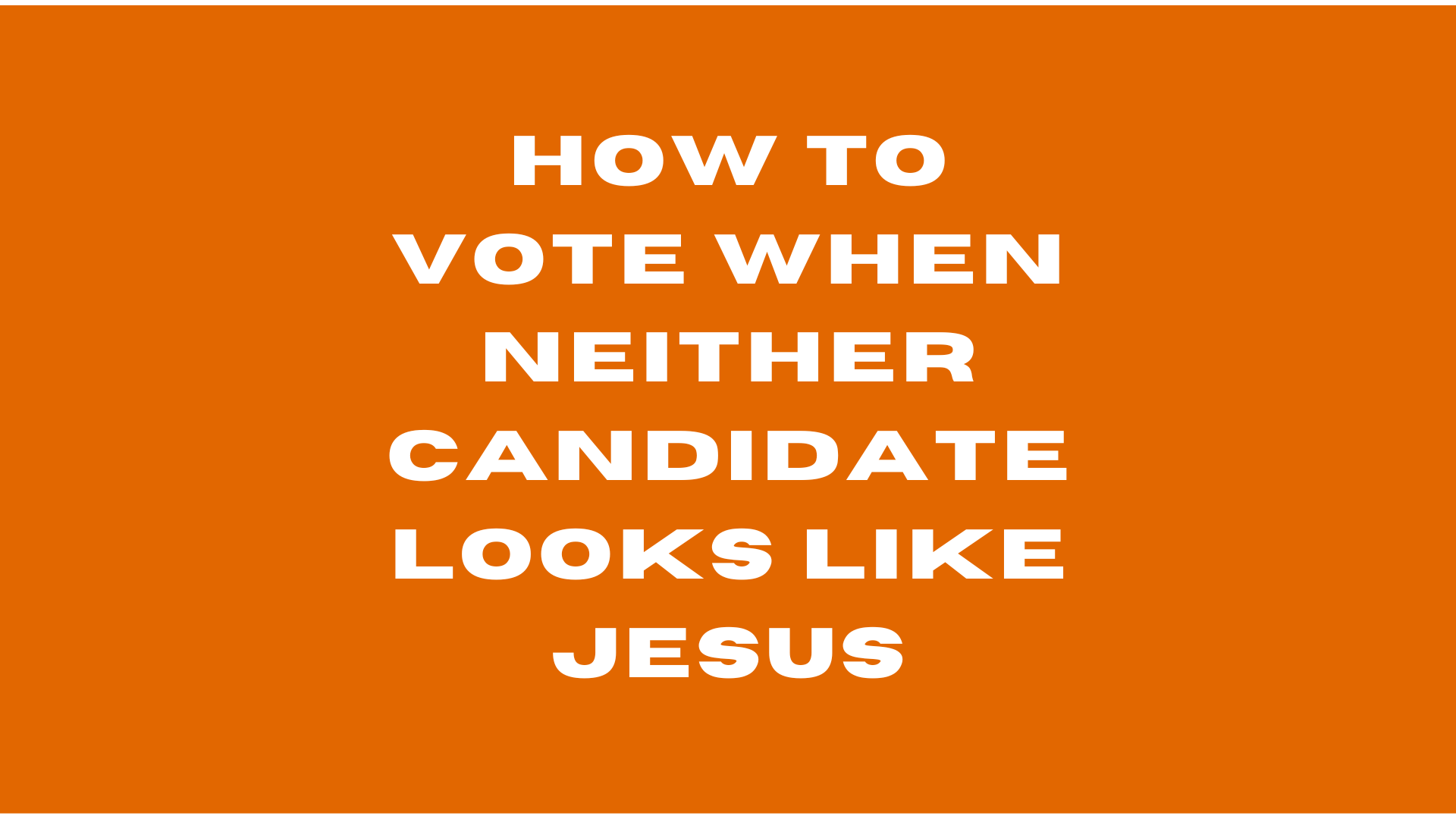How To Vote Biblically When Neither Candidate Looks Anything Like Jesus
Sometimes we are faced with election choices that seem clear and easy. Other times our ballots are more confusing and complex, filled with candidates that do not seem to evidence the fruit of God’s Holy Spirit. What is a Christian to do in such circumstances?
Have you voted? Are you planning on it? Have you considered biblical truths and principles as you decide who you’d like to see elected? Here are biblical references and wisdom for your consideration with the current election but also for future elections as well!
1. Consider Your Status - You Are An Exile Too (Jeremiah 29:4, 1 Peter 2:11). When voting always remember that your ultimate allegiance, loyalty, and hope is to a greater Kingdom found only in Christ. How do your political interactions and decisions reflect your eternal citizenship?
Philippians 3:20 “But our citizenship is in heaven, and from it we await a Savior, the Lord Jesus Christ”
2. Consider Your Responsibilities (Jeremiah 29:5–7). Apathy, indifference, and laziness are not biblical options. We must “seek the welfare” of where God has placed us to “find our welfare” and the voting booth is an important place to make a difference where you live.
3. Consider Your Decisions Regarding Leaders (Jeremiah 29:8). There are many smooth-talkers in our world who seek to deceive us for their own gain. We need to be very careful when we entrust our ears, eyes, mind, heart, and vote to an individual.
4. Consider the Words, Past Promises, & Progress of the Individual (Jeremiah 29:8–9, Jeremiah 27:14). Is the candidate a truth-teller or a liar? Out of the heart the mouth speaks. Did they try to make good on their promises? Listen and consider.
Isaiah 5:20–21 “Woe to those who call evil good and good evil, who put darkness for light and light for darkness, who put bitter for sweet and sweet for bitter! Woe to those who are wise in their own eyes, and shrewd in their own sight!”
5. Consider the Character of the Individual (Matthew 7:20–23, Titus 1:15–16). Just because someone says they are a Christian doesn’t make them a Christian. The test of character over time reveals outwardly what is really going on inwardly. Character matters.
6. Consider the Platform of the Party (Jeremiah 29:9). Sometimes God sends leaders who are a blessing to a nation as they follow God’s Word. Other times God sends leaders to act out His judgment. In a two-party system, the party’s platform is significant. Which party’s platform is most in accordance with God’s revealed will in the Bible?
7. Consider the Issues (in no particular order), their Complexities, and their Importance (Galatians 5:13–15, Romans 14:1, 2 Corinthians 10:5). Economics, energy, environment, taxes, poverty, abortion, euthanasia (assisted suicide), social security, religious liberty, gender & sexuality (LGTBQ+ Issues), family & marriage, healthcare, national defense & security, global issues, immigration , education, criminal justice, law enforcement, judicial philosophy, gun issues, race issues, governmental/constitutional Philosophy & Methodology
We must consider this spectrum of issues and prioritize them biblically. How do these issues affect the next generation, the unborn, widows, orphans, your neighbors, yourself? Which issues are more debatable opinions? Which issues does God speak clearly to in the Bible? Which issues have longer-lasting and more permanent/irreversible impacts?
Proverbs 31:8 “Open your mouth for the mute, for the rights of all who are destitute.”
8. Consider Your Options - What Decision Follows God Plan? (James 4:17, Romans 14:23) Do you consider your vote to be “for” or “against” someone or some policy? Is your decision informed concerning the individual and the party they represent? Are you voting for the “lesser of two evils” or does your faith-filled conscience guide you towards a philosophy “of two evils, choose neither”? May our political decisions be informed and led by our faith. May our votes honor God by following His wisdom and seeking out the welfare for the place in which He has sent us.
Jeremiah 29:7 "But seek the welfare of the city where I have sent you into exile, and pray to the LORD on its behalf, for in its welfare you will find your welfare.”
Biblically. The Bible has a lot to say about Biblical issues. God cares about the poor, immigrants, marriage, dignity of life at all stages (including unborn babies, terminally ill, and elderly), racial equity, religious liberty, sexual ethics, war, economics, international relations, women’s rights, children’s rights, education, housing, and criminal justice.
Which politicians, if any, model a genuine trust in Jesus? Which party’s policies and platforms are most in line with God’s plan for humanity? These questions are important in clarifying how to vote in complicated and contentious times. Know what God says before you vote.
1 Samuel 12:14–15 “If you will fear the LORD and serve him and obey his voice and not rebel against the commandment of the LORD, and if both you and the king who reigns over you will follow the LORD your God, it will be well. But if you will not obey the voice of the LORD, but rebel against the commandment of the LORD, then the hand of the LORD will be against you and your king.”
Privately. Why advertise your vote? Is pride tied to your partisan politics? Do you honestly think that your social media posts make people change their votes? Would you change your vote or position because of someone else’s yard sign, t-shirt, bumpersticker, hat, or social media post?
Many Christians have done great damage to their Christian witness through political bias, pride, snarkiness, mockery, and endorsement of ungodly characters. Go private with your political persuasions during this polarized season.
Proverbs 10:19 “When words are many, transgression is not lacking, but whoever restrains his lips is prudent.”
Wisely. Are you willing to reconsider your vote? Would you reevaluate your opinions? Have you listened closely and considered the positions of all sides? Do you understand the perspectives of those with a different political persuasion? Do your homework before you cast your ballot and don’t just trust the sound bites and media moments.
Proverbs 11:14 “Where there is no guidance, a people falls, but in an abundance of counselors there is safety.”
Selflessly. Do you vote only for what is in your best interest and agenda? Or are you voting in the best interest of the common good? Vote in a way that benefits and prioritizes others more than yourself.
Philippians 2:3–4 “Do nothing from selfish ambition or conceit, but in humility count others more significant than yourselves. Let each of you look not only to his own interests, but also to the interests of others.”
Humbly & Respectfully. Your vote is important, but what changes a nation ultimately is the Gospel. Are you more passionate and public about your politics or about your Jesus? Do you put more hope in the next election cycle than you do in Jesus’ return?
Godly Christians often feel led to vote in different ways. Some may vote Republican. Others feel led to vote Democrat. Still others choose to vote for a third party candidate that might never win. Others Christians may feel called not to vote at all. You may be right in the choice you make, but then again, you could be wrong. Be humble.
People will view issues differently than you. Be kind. Friends, family, coworkers and neighbors will vote differently than you. That’s their prerogative, stay calm. Don’t let discussions devolve into arguments. Know where you stand but be respectful towards others.
Romans 14:1 “As for the one who is weak in faith, welcome him, but not to quarrel over opinions.”
May these truths and principles guide us into, through, and beyond this election season.

